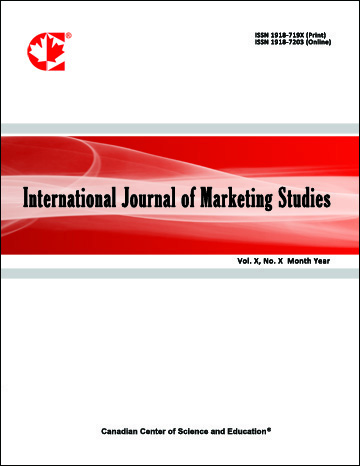Purchase Intention of Organic Food in Malaysia; A Religious Overview
- Mohd Rizaimy Shaharudin
- Jacqueline Junika Pani
- Suhardi Wan Mansor
- Shamsul Jamel Elias
- Daing Maruak Sadek
Abstract
This study is about discoveries of the religious factor and its influence towards purchase intention of organic food in Malaysia. Each religion teaches its followers to consume healthy food in their daily lives. Organic food is commonly known for its healthier content without the use of pesticides, herbicides, inorganic fertilizers, antibiotics and growth hormones. To a certain extent organic food is directly related to Halal, a preconditioned to the Muslim to consume certain permitted foods and preparation. Organic chicken for instance is different from the ordinary chicken as the breeding and growth require the ‘natural way’ technique rather than the use of substance, vaccine and chemical to reduce the chicken maturity age. This is also subject to the use of unsafe and non-halal vaccine that is unhygienic and unsafe to consume. Furthermore, it also incorporates element of respects to the animal welfare which is consistent with the Shariah requirements. However, not every consumer view such circumstances as important though being encouraged by their religion to consume such food in a way promoted by the organic foods. The research aims to identify the religious factor and its impact towards the customer purchase intention in Malaysia. The findings of the study indicated that religious factor was found to have less impact on customer purchase intention of organic food. This is because the consumers could be looking on other vast factors such as perceived value and health consciousness in deciding to purchase organic food products. The consumers may be leaving the responsibility to the respective government enforcement agencies, local authorities and religious departments to look on both organic conventional foods produced and served in the country. They may also perceive that the existing conventional foods are perfectly matched with organic food and the consumers are fully confident that the foods are prepared in a way permitted by their religion. The result has shown some differences with the previous literature which described that religious factor plays one of the most influential roles in shaping food choice in certain countries of the world. To date, there have been very minimal studies conducted by taking into consideration the organic food especially to the consumers in Malaysia. Hence, this study is expected to provide understanding to both the industry players as well as academicians on the factors that influence Malaysian customer purchase intention towards organic food products as such phenomena might be different from one country to another. Future research should focus on the similar study of religious factor affecting customer purchase intention towards organic food products with the extended scope to all states in Peninsular Malaysia as well as in Sabah and Sarawak. By doing this, hopefully we can get a clearer picture on the tested existing and new variables which can be further examined. Eventually, a comparison can be made between the findings so that such constructible findings and conclusions can be made to the study.
- Full Text:
 PDF
PDF
- DOI:10.5539/ijms.v2n1p96
Journal Metrics
Google-based Impact Factor (2021): 1.34
h-index (July 2022): 70
i10-index (July 2022): 373
Index
- Academic Journals Database
- CNKI Scholar
- EconBiz
- Electronic Journals Library
- Excellence in Research for Australia (ERA)
- GETIT@YALE (Yale University Library)
- Harvard Library
- IBZ Online
- Infotrieve
- JournalTOCs
- LOCKSS
- MIAR
- PKP Open Archives Harvester
- RePEc
- ResearchGate
- ROAD
- Scilit
- SHERPA/RoMEO
- Stanford Libraries
- UCR Library
Contact
- Alyssa SunEditorial Assistant
- ijms@ccsenet.org
